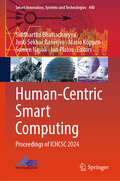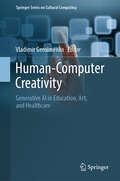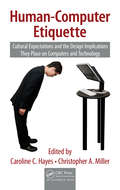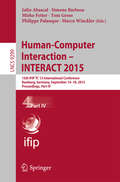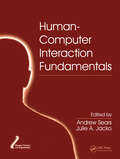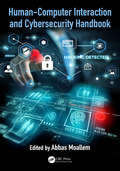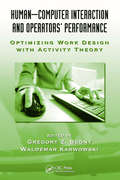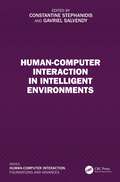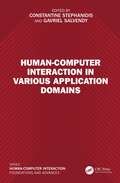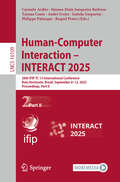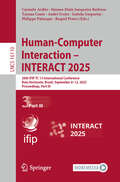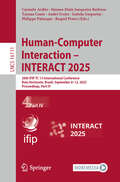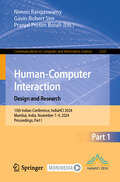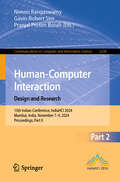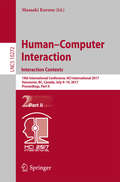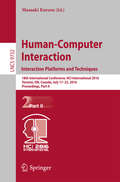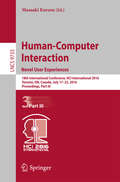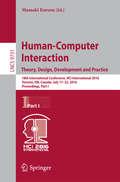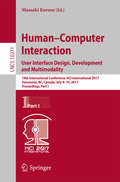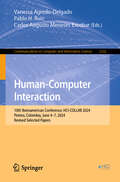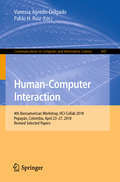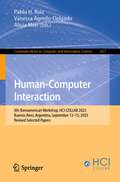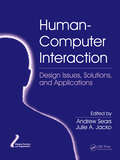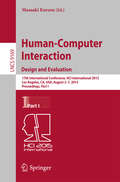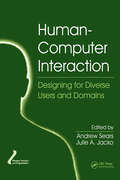- Table View
- List View
Human-Centric Smart Computing: Proceedings of ICHCSC 2024 (Smart Innovation, Systems and Technologies #440)
by Mario Köppen Siddhartha Bhattacharyya Jan Platos Jyoti Sekhar Banerjee Somen NayakThis book includes high-quality research papers presented at the Third International Conference on Human-Centric Smart Computing (ICHCSC 2024), held in Jaipur, India, during July 25–26, 2024. The topics covered in the book are human-centric computing, hyperconnectivity, and data science. The book presents innovative work by leading academics, researchers, and experts from industry.
Human-Computer Creativity: Generative AI in Education, Art, and Healthcare (Springer Series on Cultural Computing)
by Vladimir GeroimenkoThis pioneering volume showcases how generative AI has evolved from a mere tool to a creative partner, transforming the boundaries of innovation and collaboration across various disciplines. With contributions from 53 global experts spanning 21 countries, this comprehensive resource explores the transformative impact of AI on education, art, and healthcare. It reveals how AI enhances learning experiences, fosters new artistic expressions, and revolutionises patient care and medical research. Organised into five thematic parts, the book offers a balanced mix of conceptual frameworks, case studies, and practical insights, providing readers with a thorough understanding of how human ingenuity and artificial intelligence intersect to solve problems, inspire creativity, and redefine industries. Whether you are an academic, practitioner, or inquisitive reader, this volume invites you to engage with the cutting-edge possibilities of generative AI and embrace the future of human-computer collaboration.
Human-Computer Etiquette: Cultural Expectations and the Design Implications They Place on Computers and Technology (Supply Chain Integration Modeling, Optimization and Application)
by Caroline C. Hayes Christopher A. MillerWritten by experts from various fields, this edited collection explores a wide range of issues pertaining to how computers evoke human social expectations. The book illustrates how socially acceptable conventions can strongly impact the effectiveness of human-computer interactions and how to consider such norms in the design of human-computer inter
Human-Computer Interaction - INTERACT 2015
by Tom Gross Marco Winckler Philippe Palanque Julio Abascal Simone Barbosa Mirko FetterThe four-volume set LNCS 9296-9299 constitutes the refereed proceedings of the 15th IFIP TC13 International Conference on Human-Computer Interaction, INTERACT 2015, held in Bamberg, Germany, in September 2015. The 41 papers included in the first volume are organized in topical sections on accessibility; accessible interfaces for blind people; accessible interfaces for older adults; affective HCI and emotions and motivational aspects; alternative input; alternative input devices for people with disabilities; interfaces for cognitive support; brain-computer interaction; cognitive factors.
Human-Computer Interaction Fundamentals (Human Factors and Ergonomics)
by Julie A. Jacko Andrew SearsHailed on first publication as a compendium of foundational principles and cutting-edge research, The Human-Computer Interaction Handbook has become the gold standard reference in this field. Derived from select chapters of this groundbreaking and authoritative resource, Human-Computer Interaction Fundamentals emphasizes emerging topics such as sen
Human-Computer Interaction and Cybersecurity Handbook (Human Factors and Ergonomics)
by Abbas Moallem<P><P>Recipient of the SJSU San Jose State University Annual Author & Artist Awards 2019 <P><P>Recipient of the SJSU San Jose State University Annual Author & Artist Awards 2018 <P><P>Cybersecurity, or information technology security, focuses on protecting computers and data from criminal behavior. The understanding of human performance, capability, and behavior is one of the main areas that experts in cybersecurity focus on, both from a human–computer interaction point of view, and that of human factors. This handbook is a unique source of information from the human factors perspective that covers all topics related to the discipline. It includes new areas such as smart networking and devices, and will be a source of information for IT specialists, as well as other disciplines such as psychology, behavioral science, software engineering, and security management. <P><P>Features <li>Covers all areas of human–computer interaction and human factors in cybersecurity <li>Includes information for IT specialists, who often desire more knowledge about the human side of cybersecurity <li>Provides a reference for other disciplines such as psychology, behavioral science, software engineering, and security management <li>Offers a source of information for cybersecurity practitioners in government agencies and private enterprises <li>Presents new areas such as smart networking and devices
Human-Computer Interaction and Operators' Performance: Optimizing Work Design with Activity Theory
by Waldemar Karwowski Gregory Z. BednyA collection of works authored by leading scientists from the US and Russia, Human-Computer Interaction and Operators' Performance: Optimizing Work Design with Activity Theory describes applied and systemic-structural activity theory as it is used to study human-computer interaction, aviation, design, and training. Important from a theoretical and
Human-Computer Interaction in Intelligent Environments: 5th International Conference, Uahci 2009, Held As Part Of Hci International 2009, San Diego, Ca, Usa, July 19-24, 2009. Proceedings, Part Ii (Lecture Notes In Computer Science Ser. #5615)
by Gavriel Salvendy Constantine StephanidisThis book offers readers a holistic understanding of intelligent environments, encompassingtheir definition, design, interaction paradigms, the role of Artificial Intelligence (AI), and theassociated broader philosophical and procedural aspects. Elaborates on AI research and the creation of intelligent environments. Zooms in on designing interactions with the IoT, intelligent agents and robots. Discusses overarching topics for the design of intelligent environments, including user interface adaptation, design for all, sustainability, cybersecurity, privacy and trust. Provides insights into the intricacies of various intelligent environment contexts, such as in automotive, urban interfaces, smart cities and beyond. This book has been written for individuals interested in Human-Computer Interaction research and applications.
Human-Computer Interaction in Various Application Domains
by Gavriel Salvendy Constantine StephanidisHuman-Computer Interaction (HCI) is a multidisciplinary research and applied field targeted to studying people interacting with information technology and designing usable and efficient systems for them. This book outlines the state‑of‑the‑art of HCI research in the respective domain such as health, games, transportation, industry, and entertainment.This book Bridges the gap between theory and practice by presenting how to apply HCI methods and tools in specific domains. Offers concrete examples of HCI use in real-world situations. Presents case-specific best practices, tips, and tricks. Includes chapters that are well-studied and purposefully selected, representing important theoretical, practical, and research areas in HCI. Includes domains ranging from the roots and the classic approaches of human-computer interaction to contemporary advancements. This book is a fascinating read for individuals interested in Human-Computer Interaction research and applications.
Human-Computer Interaction – INTERACT 2025: 20th IFIP TC 13 International Conference, Belo Horizonte, Brazil, September 8–12, 2025, Proceedings, Part II (Lecture Notes in Computer Science #16109)
by Philippe Palanque Simone Diniz Junqueira Barbosa Carmelo Ardito André Freire Tayana Conte Isabela Gasparini Raquel PratesThis four-volume set LNCS 16108-16111 constitutes the proceedings of the 20th IFIP TC 13 International Conference on Human-Computer Interaction, INTERACT 2025, held in Belo Horizonte, Brazil, during September 8–12, 2025. The 69 full papers, 34 short papers and 79 papers of other types included in this book were carefully reviewed and selected from 330 submissions. They were organized in topical sections as follows: Part I: Accessibility; Adaptive and AI-Powered Learning Systems; Aesthetics in HCI; Affective HCI and Emotion; and Augmented Reality. Part II: Computer-Supported Cooperative Work; Context-Dependent Systems; Design and Evaluation in Smart and Ubiquitous Contexts; Designing for Identity, Safety, and Cultural Values; Emotionally-Informed Design; HCD for Mission-Critical Systems; HCI in Formal and Inclusive Learning Contexts; HCI in Healthcare and Wellbeing; and Human-AI Interaction. Part III: Interaction with Small or Large Displays; Learning Tools and Intelligent Tutoring; Methodologies for HCI; Multimodal Assistive Interfaces; Usability Evaluation Methods; Usable Privacy and Security. Part IV: Courses; Industrial Experiences; Interactive Demonstrations; Panels; Posters; and Workshops.
Human-Computer Interaction – INTERACT 2025: 20th IFIP TC 13 International Conference, Belo Horizonte, Brazil, September 8–12, 2025, Proceedings, Part III (Lecture Notes in Computer Science #16110)
by Philippe Palanque Simone Diniz Junqueira Barbosa Carmelo Ardito André Freire Tayana Conte Isabela Gasparini Raquel PratesThis four-volume set LNCS 16108-16111 constitutes the proceedings of the 20th IFIP TC 13 International Conference on Human-Computer Interaction, INTERACT 2025, held in Belo Horizonte, Brazil, during September 8–12, 2025. The 69 full papers, 34 short papers and 79 papers of other types included in this book were carefully reviewed and selected from 330 submissions. They were organized in topical sections as follows: Part I: Accessibility; Adaptive and AI-Powered Learning Systems; Aesthetics in HCI; Affective HCI and Emotion; and Augmented Reality. Part II: Computer-Supported Cooperative Work; Context-Dependent Systems; Design and Evaluation in Smart and Ubiquitous Contexts; Designing for Identity, Safety, and Cultural Values; Emotionally-Informed Design; HCD for Mission-Critical Systems; HCI in Formal and Inclusive Learning Contexts; HCI in Healthcare and Wellbeing; and Human-AI Interaction. Part III: Interaction with Small or Large Displays; Learning Tools and Intelligent Tutoring; Methodologies for HCI; Multimodal Assistive Interfaces; Usability Evaluation Methods; Usable Privacy and Security. Part IV: Courses; Industrial Experiences; Interactive Demonstrations; Panels; Posters; and Workshops.
Human-Computer Interaction – INTERACT 2025: 20th IFIP TC 13 International Conference, Belo Horizonte, Brazil, September 8–12, 2025, Proceedings, Part IV (Lecture Notes in Computer Science #16111)
by Philippe Palanque Simone Diniz Junqueira Barbosa Carmelo Ardito André Freire Tayana Conte Isabela Gasparini Raquel PratesThis four-volume set LNCS 16108-16111 constitutes the proceedings of the 20th IFIP TC 13 International Conference on Human-Computer Interaction, INTERACT 2025, held in Belo Horizonte, Brazil, during September 8–12, 2025. The 69 full papers, 34 short papers and 79 papers of other types included in this book were carefully reviewed and selected from 330 submissions. They were organized in topical sections as follows: Part I: Accessibility; Adaptive and AI-Powered Learning Systems; Aesthetics in HCI; Affective HCI and Emotion; and Augmented Reality. Part II: Computer-Supported Cooperative Work; Context-Dependent Systems; Design and Evaluation in Smart and Ubiquitous Contexts; Designing for Identity, Safety, and Cultural Values; Emotionally-Informed Design; HCD for Mission-Critical Systems; HCI in Formal and Inclusive Learning Contexts; HCI in Healthcare and Wellbeing; and Human-AI Interaction. Part III: Interaction with Small or Large Displays; Learning Tools and Intelligent Tutoring; Methodologies for HCI; Multimodal Assistive Interfaces; Usability Evaluation Methods; Usable Privacy and Security. Part IV: Courses; Industrial Experiences; Interactive Demonstrations; Panels; Posters; and Workshops.
Human-Computer Interaction. Design and Research: 15th Indian Conference, IndiaHCI 2024, Mumbai, India, November 7–9, 2024, Proceedings, Part I (Communications in Computer and Information Science #2337)
by Nimmi Rangaswamy Gavin Robert Sim Pranjal Protim BorahThis two-volume proceedings, set CCIS 2337-2338, constitutes of the proceedings of 15th Indian Conference on Human-Computer Interaction Design and Research, IndiaHCI 2024, held in Mumbai, India, during November 7–9, 2024. The 30 full papers and 12 short papers included in this volume were carefully reviewed and selected from 235 submissions. These papers belong to various tracks which have been divided between the two volumes as follows: - Part I: Paper Track. Part II: Game Design Track, Student Research Consortium Track; Posters and demos Track; Artworks and installations Track.
Human-Computer Interaction. Design and Research: 15th Indian Conference, IndiaHCI 2024, Mumbai, India, November 7–9, 2024, Proceedings, Part II (Communications in Computer and Information Science #2338)
by Nimmi Rangaswamy Gavin Robert Sim Pranjal Protim BorahThis two-volume proceedings, set CCIS 2337-2338, constitutes of the proceedings of 15th Indian Conference on Human-Computer Interaction Design and Research, IndiaHCI 2024, held in Mumbai, India, during November 7–9, 2024. The 30 full papers and 12 short papers included in this volume were carefully reviewed and selected from 235 submissions. These papers belong to various tracks which have been divided between the two volumes as follows: - Part I: Paper Track. Part II: Game Design Track, Student Research Consortium Track; Posters and demos Track; Artworks and installations Track.
Human-Computer Interaction. Interaction Contexts
by Masaaki KurosuThe five-volume set LNCS 8004--8008 constitutes the refereed proceedings of the 15th International Conference on Human-Computer Interaction, HCII 2013, held in Las Vegas, NV, USA in July 2013. The total of 1666 papers and 303 posters presented at the HCII 2013 conferences was carefully reviewed and selected from 5210 submissions. These papers address the latest research and development efforts and highlight the human aspects of design and use of computing systems. The papers accepted for presentation thoroughly cover the entire field of human-computer Interaction, addressing major advances in knowledge and effective use of computers in a variety of application areas. This volume contains papers in the thematic area of human-computer interaction, addressing the following major topics: identity, privacy and trust; user studies; interaction for society and community; HCI for business and innovation.
Human-Computer Interaction. Interaction Platforms and Techniques
by Masaaki KurosuThe 3-volume set LNCS 9731, 9732, and 9733 constitutes the refereed proceedings of the 18th International Conference on Human-Computer Interaction, HCII 2016, held in Toronto, ON, Canada, in July 2016. The total of 1287 papers presented at the HCII 2016 conferences was carefully reviewed and selected from 4354 submissions. The papers thoroughly cover the entire field of Human-Computer Interaction, addressing major advances in knowledge and effective use of computers in a variety of application areas. The volumes constituting the full 27-volume set of the conference proceedings.
Human-Computer Interaction. Novel User Experiences
by Masaaki KurosuThe 3-volume set LNCS 9731, 9732, and 9733 constitutes the refereed proceedings of the 18th International Conference on Human-Computer Interaction, HCII 2016, held in Toronto, ON, Canada, in July 2016. The total of 1287 papers presented at the HCII 2016 conferences was carefully reviewed and selected from 4354 submissions. The papers thoroughly cover the entire field of Human-Computer Interaction, addressing major advances in knowledge and effective use of computers in a variety of application areas. The volumes constituting the full 27-volume set of the conference proceedings.
Human-Computer Interaction. Theory, Design, Development and Practice
by Masaaki KurosuThe 3-volume set LNCS 9731, 9732, and 9733 constitutes the refereed proceedings of the 18th International Conference on Human-Computer Interaction, HCII 2016, held in Toronto, ON, Canada, in July 2016. The total of 1287 papers presented at the HCII 2016 conferences was carefully reviewed and selected from 4354 submissions. The papers thoroughly cover the entire field of Human-Computer Interaction, addressing major advances in knowledge and effective use of computers in a variety of application areas. The volumes constituting the full 27-volume set of the conference proceedings are listed on pages VII and VIII.
Human-Computer Interaction. User Interface Design, Development and Multimodality
by Masaaki KurosuThe two-volume set LNCS 10271 and 10272 constitutes the refereed proceedings of the 19th International Conference on Human-Computer Interaction, HCII 2017, held in Vancouver, BC, Canada, in July 2017. The total of 1228 papers presented at the 15 colocated HCII 2017 conferences was carefully reviewed and selected from 4340 submissions. The papers address the latest research and development efforts and highlight the human aspects of design and use of computing systems. They cover the entire field of Human-Computer Interaction, addressing major advances in knowledge and effective use of computers in a variety of application areas. The papers included in this volume cover the following topics: HCI theory and education; HCI, innovation and technology acceptance; interaction design and evaluation methods; user interface development; methods, tools, and architectures; multimodal interaction; and emotions in HCI.
Human-Computer Interaction: 10th Iberoamerican Conference, HCI-COLLAB 2024, Pereira, Colombia, June 4–7, 2024, Revised Selected Papers (Communications in Computer and Information Science #2332)
by Vanessa Agredo-Delgado Pablo H. Ruiz Carlos Augusto Meneses EscobarThis book constitutes the refereed proceedings of the 10th Iberoamerican Conference on Human-Computer Interaction, HCI-COLLAB 2024, held in Pereira, Colombia, during June 4–7, 2024. The 26 full papers presented here were carefully selected and reviewed from 85 submissions. Among the topics addressed in this edition were key areas such as accessibility, usability, video games and gamification, computational thinking, Internet of Things (IoT), software engineering, information and communication technologies (ICT) in education, virtual, augmented and mixed reality applied to education, artificial intelligence in HCI, industry 4.0, infotainment systems, collaborative work and learning, cognition and interaction. The diversity and topicality of these topics reflect the breadth of the discipline and its relevance to meet the technological and social challenges of today's world.
Human-Computer Interaction: 4th Iberoamerican Workshop, Hci-collab 2018, Popayán, Colombia, April 23-27, 2018, Revised Selected Papers (Communications In Computer And Information Science #847)
by Vanessa Agredo-Delgado Pablo H. RuizThis book constitutes the thoroughly refereed proceedings of the 4th Iberoamerican Workshop on Human-Computer Interaction, HCI-Collab 2018, held in Popayán, Colombia, in April 2018. The 18 full papers presented in this volume were carefully reviewed and selected from 83 submissions. The papers are dealing with topics such as emotional interfaces, HCI and videogames, computational thinking, collaborative systems, software engineering and ICT in education.
Human-Computer Interaction: 9th Iberoamerican Workshop, HCI-COLLAB 2023, Buenos Aires, Argentina, September 13–15, 2023, Revised Selected Papers (Communications in Computer and Information Science #1877)
by Vanessa Agredo-Delgado Pablo H. Ruiz Alicia MonThis book constitutes the referred proceedings of the 9th Iberoamerican Workshop on Human-Computer Interaction, HCI-COLLAB 2023, held in Buenos Aires, Argentina, during September 13–15, 2023. The 23 full papers presented in this book were carefully reviewed and selected from 84 submissions. They cover a variety of topics related to HCI such as: Emotional Interfaces, Usability, Video Games and Gamification, Computational Thinking, Internet of Things (IoT), Software Engineering, ICT in Education, Augmented and Mixed Virtual Reality for Education, Emotional Interfaces, Adaptive Instructional Systems, Accessibility, Artificial Intelligence in HCI, Industry 4. 0 and HCI, Infotainment Systems, Intelligent Systems, Collaborative Work and Learning, Cognition, and Interaction, among others.
Human-Computer Interaction: Design Issues, Solutions, and Applications (Human Factors and Ergonomics)
by Julie A. Jacko Andrew SearsHailed on first publication as a compendium of foundational principles and cutting-edge research, The Human-Computer Interaction Handbook has become the gold standard reference in this field. Derived from select chapters of this groundbreaking resource, Human-Computer Interaction: Design Issues, Solutions, and Applications focuses on HCI from a pri
Human-Computer Interaction: Design and Evaluation
by Masaaki KurosuThe 3-volume set LNCS 9169, 9170, 9171 constitutes the refereed proceedings of the 17th International Conference on Human-Computer Interaction, HCII 2015, held in Los Angeles, CA, USA, in August 2015. The total of 1462 papers and 246 posters presented at the HCII 2015 conferences was carefully reviewed and selected from 4843 submissions. These papers address the latest research and development efforts and highlight the human aspects of design and use of computing systems. The papers in LNCS 9169 are organized in topical sections on HCI theory and practice; HCI design and evaluation methods and tools; interaction design; emotions in HCI.
Human-Computer Interaction: Designing for Diverse Users and Domains (Human Factors and Ergonomics)
by Julie A. Jacko Andrew SearsHailed on first publication as a compendium of foundational principles and cutting-edge research, The Human-Computer Interaction Handbook has become the gold standard reference in this field. While human-computer interaction may have emerged from within computing, significant contributions have come from a variety of fields including industrial engineering, psychology, education, and graphic design. No where is this more apparent then when designing solutions for users as diverse as children, older adults, and individuals with physical, cognitive, visual, or hearing impairments. Derived from select chapters in The Human-Computer Interaction Handbook, this volume emphasizes design for these groups and also discusses HCI in the context of specific domains including healthcare, games, and the aerospace industry.
